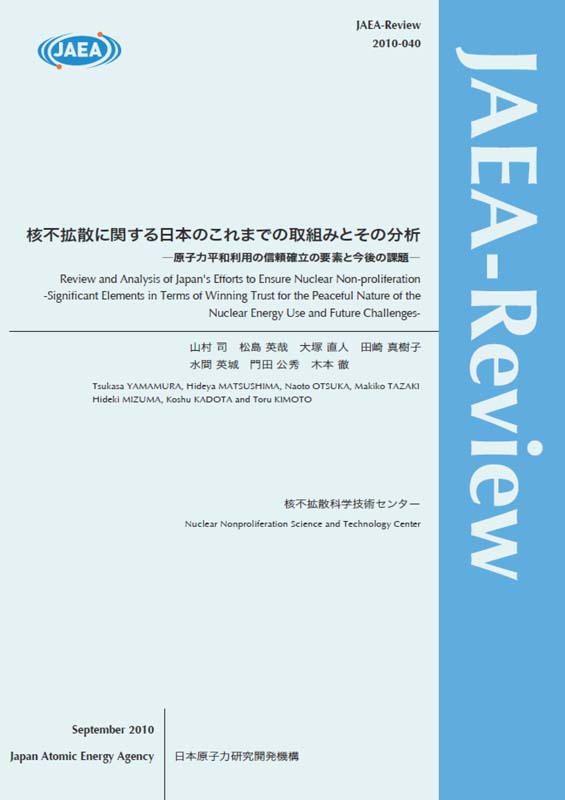Policy Research
The Integrated Support Center for Nuclear Nonproliferation and Nuclear Security (ISCN) conducts policy research, based on its technical expertise. The ISCN also disseminates information on topics and trends related to nuclear nonproliferation and nuclear security in Japan and abroad through “Trend of Nuclear Nonproliferation”, “ISCN Newsletter” and “Nuclear Nonproliferation Pocket Book” that summarizes topics of nuclear nonproliferation and nuclear security (only in Japanese).
1. Conducting policy research on nuclear nonproliferation and nuclear security, based on its technical expertise, in response to international trends related to nuclear nonproliferation and nuclear security

The main contents and results of completed and ongoing policy studies on nuclear nonproliferation and nuclear security are as follows. In conducting this research, we established the Nonproliferation Policy Research Committee, which consists mainly of experts from outside JAEA. We have considered expert opinions and findings of these experts in our research.
- (1) Research on the impact of Russia's invasion of Ukraine on nuclear non-proliferation and nuclear security
- Russia's invasion of Ukraine in 2022 led to concerns regarding nuclear non-proliferation and nuclear security such as the threat posed by nuclear weapons and unexpected nuclear accidents due to the occupation of the Zaporizhzhia nuclear power plant. Therefore, we are working on determining possible scenarios, analyzing their effects, and examining specific countermeasures for situations that would affect Japan's nuclear activities.
- (2) Analysis of factors and technical processes for achieving denuclearization
- This study aims to determine the factors influencing denuclearization and the technical processes involved in the incapacitation and decommissioning of nuclear facilities and their verification by analyzing the cases of states that have denuclearized or are making efforts toward denuclearization.
JAEA Reviews (Research Reports (in Japanese)):- Case Study and Factor Analysis of Denuclearization: JAEA-Review-2021-076
- Investigation of Libya's Case: JAEA-Review-2021-073
- Investigation of Iraq's Case: JAEA-Review-2022-020
- Investigation of South Africa's Case: JAEA-Review-2022-056
- Investigation of Former Soviet Union's (Belarus, Kazakhstan and Ukraine) Case: JAEA-Review-2023-042
- Investigation on Iran's Case: JAEA-Review-2024-041
- Investigation on DPRK's Case: JAEA-Review-2024-043
- (3) Research on measures to promote nuclear nonproliferation (safeguards) and nuclear security (collectively called “2Ss”)
- Measures to generate synergistic 2S effects and ensure their applicability in nuclear fuel cycle facilities were studied; furthermore, challenges in application were identified and countermeasures were examined.
- Synergistic 2S effects are expected to contribute to the further enhancement and efficiency of nuclear nonproliferation and nuclear security in nuclear fuel cycle facilities.
- (4) Analysis of Nuclear Non-proliferation Prerequisite in International Cooperation for Peaceful Nuclear Use and Nuclear Policy Backgrounds of Major Nuclear Supplier States (Research Review: JAEA-Review-2014-029)
- We analyzed the role of nuclear nonproliferation requirements in bilateral nuclear cooperation agreements, which are legal frameworks established to ensure the peaceful use of transferred items and derived nuclear materials when nuclear equipment and technology are transferred between two countries.
- Furthermore, with regard to the new U.S.-South Korea Nuclear Cooperation Agreement that entered into force in November 2015, we summarized the analysis results regarding issues in the revision negotiations, arguments of the governments of the two countries, and the content of the new agreement in the outcome report "On the New U.S.-South Korea Nuclear Cooperation Agreement" JAEA-Review 2016-019.
- (5) Study on the Effect of the U.S. Non-proliferation Policy on Japan's Nuclear Fuel Cycle Policy (Research Review: JAEA-Review-2014-007)
- With regard to the nuclear nonproliferation policy of the U.S., which has had a significant impact on Japan's nuclear energy policy, especially its nuclear fuel cycle policy, we analyzed the history of nuclear energy policy and nonproliferation issues between Japan and the U.S., focusing on the Tokai reprocessing negotiations and the revision of the Japan-U.S. Nuclear Cooperation Agreement in 1988.
- (6) Review and Analysis of Japan's Efforts to Ensure Nuclear Non-proliferation (Research Review: JAEA-Review-2010-040)
- With regard to the peaceful use of nuclear energy, we summarized Japan's efforts and achievements toward gaining the trust of the international community and determined the elements necessary for establishing trust in the peaceful use of nuclear energy.
- (7) Research on Assurance System of Nuclear Fuel Supply (Research Review: JAEA-Review-2009-035)
- We investigated and analyzed various concepts of "assurance of nuclear fuel supply" proposed to strengthen the international nuclear nonproliferation regime, including information obtained via overseas surveys.
- (8) Research on improving the reliability and transparency of peaceful use of nuclear energy in the Asian region
- We provided cooperation in the development of nuclear nonproliferation systems to countries that have newly introduced nuclear power generation.
- In June 2016, we signed a memorandum of understanding for cooperation with the Vietnam Agency for Radiation and Nuclear Safety (VARANS), which led to the development of our support for human resource development in Asian countries.
- (9) Research on nuclear non-proliferation and nuclear security related to the back end of nuclear fuel cycle
- Issues related to nuclear nonproliferation and nuclear security at the back-end of nuclear fuel cycle, including the direct disposal of spent fuel, were identified and countermeasures were studied.
2. Collecting and analyzing worldwide information on nuclear nonproliferation and nuclear security, and developing a database
We are surveying topics and trends related to nuclear nonproliferation and nuclear security in the world. The collected data, along with our analysis, are published in “ISCN Newsletter” and “Trend of Nuclear nonproliferation”. Both are published in Japanese only.
